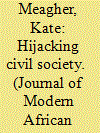|
|
|
Sort Order |
|
|
|
Items / Page
|
|
|
|
|
|
|
| Srl | Item |
| 1 |
ID:
077587


|
|
|
|
|
| Publication |
2007.
|
| Summary/Abstract |
Analyses of the rise of violent vigilantism in Africa have focused increasingly on the 'uncivil' character of African society. This article challenges the recourse to cultural or instrumentalist explanations, in which vigilantism is portrayed as a reversion to violent indigenous institutions of law and order based on secret societies and occultist practices, or is viewed as a product of the contemporary institutional environment of clientelism and corruption in which youth struggle for their share of patronage resources. The social and political complexities of contemporary African vigilantism are revealed through an account of the rise and derailment of the infamous Bakassi Boys vigilante group of south-eastern Nigeria. Based on extensive fieldwork among the shoe producers of Aba who originally formed the Bakassi Boys in 1998, this article traces the process through which popular security arrangements were developed and subsequently hijacked by opportunistic political officials engaged in power struggles between the state and federal governments. Detailing the strategies and struggles involved in the process of political hijack, this inside account of the Bakassi Boys reveals the underlying resilience of civil notions of justice and public accountability in contemporary Africa
|
|
|
|
|
|
|
|
|
|
|
|
|
|
|
|
| 2 |
ID:
077585


|
|
|
|
|
| Publication |
2007.
|
| Summary/Abstract |
The choice of indigenous versus European languages in education should be a hotly contested issue. Surprisingly, in much of Africa it is not. African states have dramatically increased their use of local languages in education over the last decade. This increase, however, has not proceeded from vocal demands on government by various language groups. Instead, it is the result of two more subtle factors: the changed attitude of a former coloniser and the work of language NGOs on the ground. These two forces have altered governments' perceptions about the utility of African languages in their education strategies. Because this political process works through persuasion, rather than bargaining, it allows choices about language in education to be less contentious than popularly assumed, separating this process from the violent ethnolinguistic conflict that is so often associated with Africa.
|
|
|
|
|
|
|
|
|
|
|
|
|
|
|
|
| 3 |
ID:
077588


|
|
|
|
|
| Publication |
2007.
|
| Summary/Abstract |
Narrative is an important means of structuring and giving meaning to experience. While the resulting framework is incomplete because human beings choose only particular aspects to remember, narratives often persist and influence behaviour, often to poor effect. Considering this, the example of the Luo of Kenya is a cautionary one, particularly given African neopatrimonial understandings of state and society. Luo lore establishes the group as once elite and now in abject poverty, victim of a powerful and jealous Kikuyu enemy. This article explores the nature of this elite status, and the means by which group members have responded to particular indicators at the expense of others. This re-examination invites questioning of Luos' conclusion that they were, as respondents say, 'put out in the cold' from a position of prominence, a stance that has helped shape Kenya into ethnic rather than policy interests
|
|
|
|
|
|
|
|
|
|
|
|
|
|
|
|
| 4 |
ID:
077586


|
|
|
|
|
| Publication |
2007.
|
| Summary/Abstract |
This paper discusses land issues in a specific Ivorian context: that of a former no man's land located in lower Côte d'Ivoire. In this region, one does not find the autochthon-migrant dichotomy that generally structures the land issue in southern Côte d'Ivoire. This situation therefore offers an opportunity to document the conditions of access to land and inter-ethnic relationships in a situation characterised by the lack of autochthonous stakeholders. In this context, land rights and land transfers have been moulded by the interplay between migration flows, the dynamics of the smallholder plantation economy, and the rise of land markets. The picture that results is a patchwork, in terms of ethnic land control, where land rights are quite secure. The crucial land issue arises from the active land lease market, with a large acreage of land rented out to Burkinabè pineapple producers - again, without major conflicts. This situation is contrasted with the neighbouring Abouré country, where a conflict over tenancy practices arose in 2001
|
|
|
|
|
|
|
|
|
|
|
|
|
|
|
|
|
|
|
|
|